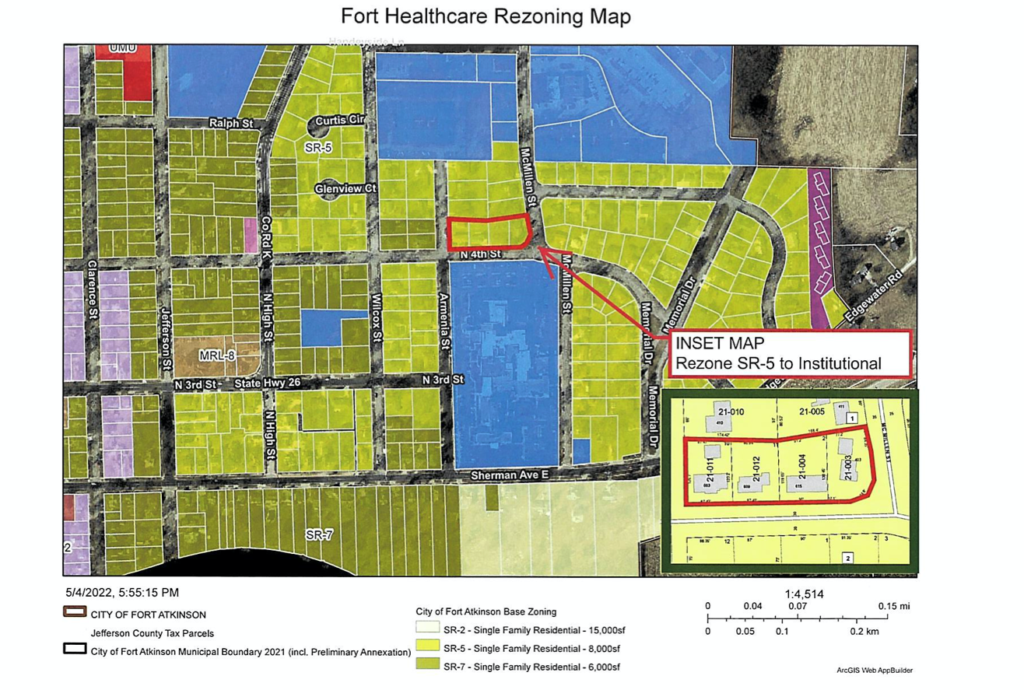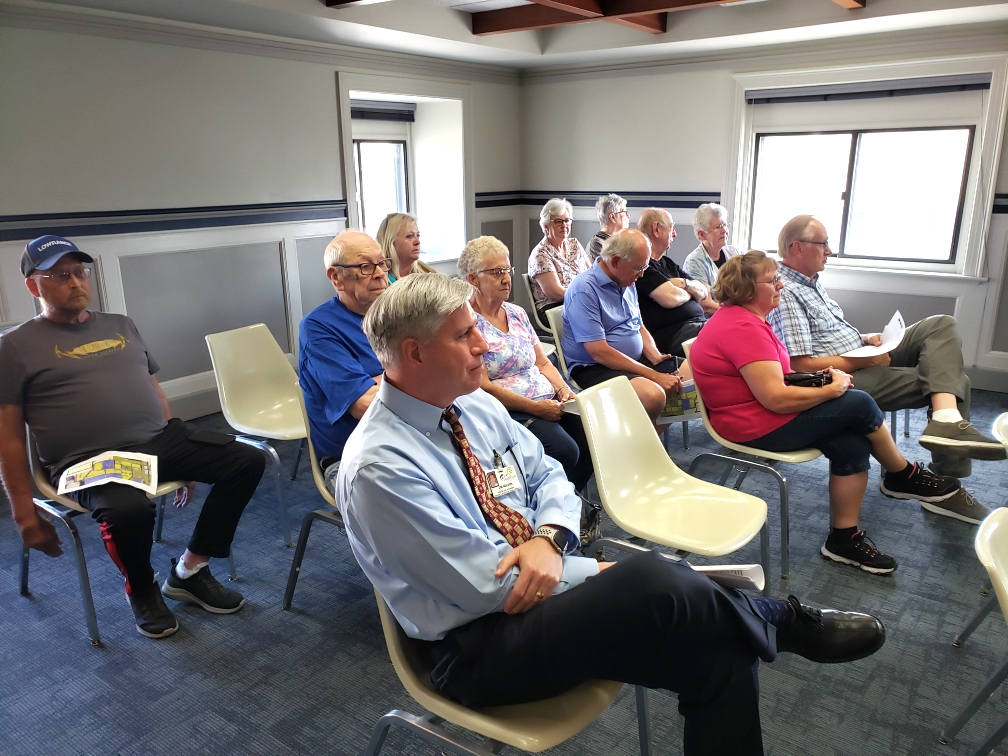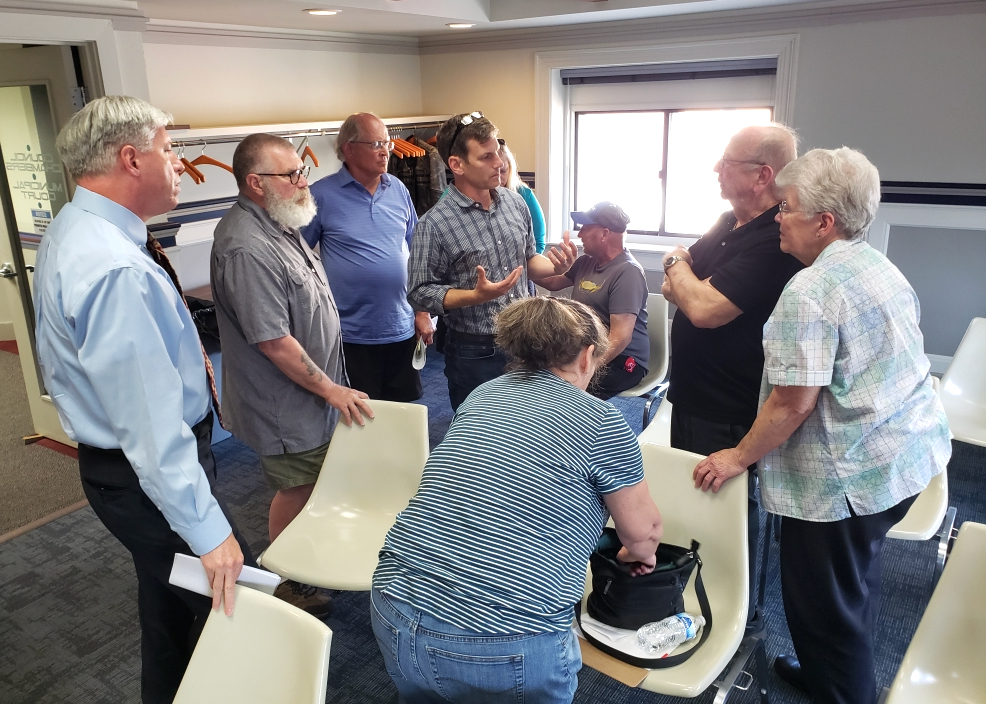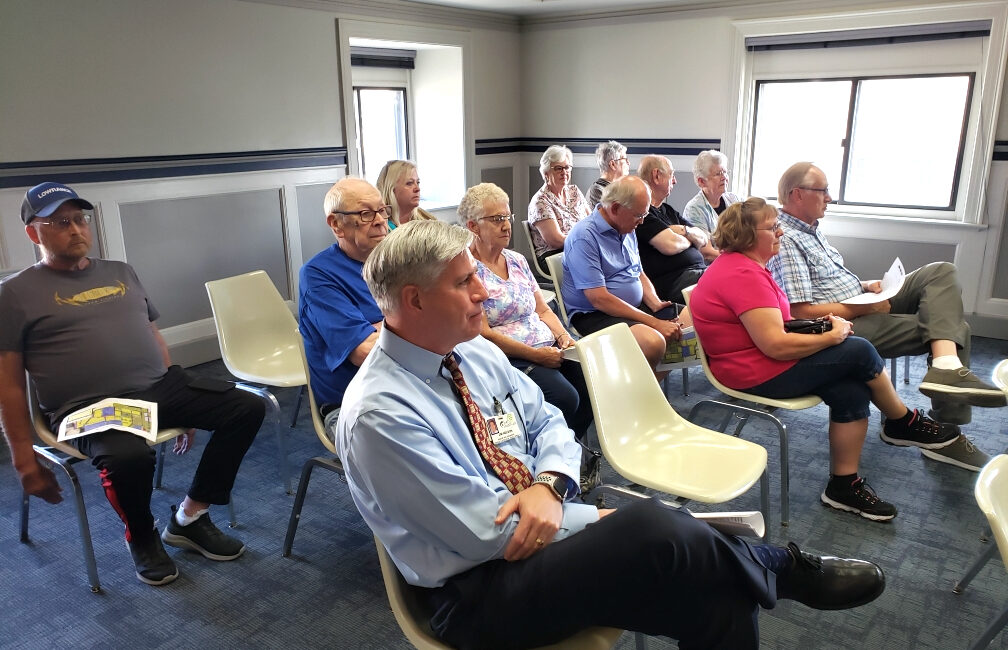By Chris Spangler
The Fort Atkinson Planning Commission has advanced the rezoning of four properties owned by Fort HealthCare from single-family residential to institutional.
During the commission’s meeting Tuesday, city engineer Andy Selle reported that Fort HealthCare intends to expand the Fort Memorial Hospital parking lot to the north.
It would move or demolish the four houses at 603, 609 and 615 North Fourth St. and 403 McMillen Ave. and seek vacating a section of North Fourth Street to do so.
Three of the houses are being given to the Homeless Coalition of Fort Atkinson, which will move them to a different site.
A remote parking lot Fort HealthCare currently uses might be eyed for new housing development in the future, Selle said.
He pointed out that the city’s Comprehensive Land-Use Plan shows an area north of the hospital, including the four properties in question and their neighbors to the north, as zoned for “community facilities” and designated in blue on the map.
“In general, the comprehensive plan dictates what the city would like to see developing in the next 10 to 20 years, and governs a lot of our planning,” Selle said.
Public hearing comments
Five neighbors of the four properties spoke during a public hearing on the zoning change.
Jeannie Newbold, 411 McMillan St., noted that her house is behind two of the four properties being discussed.
“I see this for the immediate plan this year, but I see the entire block in blue, so is that a five-year plan? … Or why is that map in blue?” she asked.
City Manager and commission Chairperson Rebecca Houseman LeMire said that the area in blue was designated as “community facilities” for future land use in the Comprehensive Land-Use Plan updated in 2019.
Newbold also said that most of her neighbors did not know about the Plan Commission meeting. She said that communication needs to be better “because we have more questions than we have answers.”
The neighbors would like to know what the city is planning one year, five years and longer down the road, she said.
“Some of the concerns are, after this is rezoned, what’s the next step? We’ve heard about North Fourth Street possibly being closed for that block. That’s really going to affect the traffic flow (and) drainage, so that is a big concern,” Newbold said.
In addition, she said that extending the parking lot will raise concerns about privacy, security, noise and the property values.
“We chose to live where we live. We take pride in our neighborhood,” Newbold said.
“I understand; we want the progress and what’s best for the city. But it can’t be at the expense of a dozen neighbors, or 20 or 30 neighbors, the entire neighborhood. Right now, I can honestly tell you that I feel stuck, so to speak. Is somebody going to want my property? Is my property value going to be toast?” she added.
Her husband, Jeff Newbold, told the commission that “this plan may constitute an illegal taking. It is a great plan; great, you want to do all this. But that plan has already started to degrade the value of the properties along that corridor. Second, you’re facilitating a private corporation, the hospital, in what would be considered reverse eminent domain.”
He said that the area to the north developed with healthcare in mind floods every year, in some instances backing up water to within 15 feet of his door.
“I have a concern that the plans that may be laid will not adequately take care of drainage, and it will end up on my property,” he said.
Newbold called the plan a bit short-sighted.
“Its best use was residential, or it wouldn’t have been residential. If we’re going to change that, then the city should have gone ahead and set up a taking, done the consumption of all those properties, done the just compensation calculations, done the change in the plan and taken it. And then work with the hospital to acquire the property at some proper remuneration for the city and the taxpayers. That’s my opinion,” Newbold said.
City attorney David Westrick later stated that the city is not taking any land.
“There’s been mentioned here today that there has been some inverse condemnation, but that is not the case, because that is where the city would condemn something for a public use,” he said.
Rather, a private landowner requested the zoning change, Westrick said.
Also speaking during the public hearing was Brenda Stevens, 515 N. Fourth St., who said she would like to know the timeline, number of parking spaces, intent on rerouting North Fourth Street and value of their homes.
Tom Ackerman, 410 Armenia St., told the commission he was concerned about noise pollution, light pollution and drainage.
He mentioned a late neighbor who had to move to a different bedroom due to car lights in a nearby parking lot, and said he himself often is startled or awakened by car alarms going off in the hospital lot.
The street and houses create a buffer of sorts, he said.
“Those are going to disappear from our perspective, and we’re going to be right up against it, and three of my four bedrooms are right up against that parking lot. So that’s going to be a pain in the butt. But the real concern is the drainage,” Ackerman said.
He said that once the parking lot is extended, all the water coming downhill will be held captive and will pour through the backyards.
Elliott Larson, 415 McMillan St., also told the panel that his biggest worry is drainage.
“I also am concerned that the hospital does own property that is only a half or three-quarters of a block away, and why can’t they use that?” he asked.
“A lot of time, from what I’ve seen in the last 20 years, it seems that the hospital puts the cart before the horse,” Larson said, noting the possibility of a new Fort HealthCare campus on land just west of the State Highway 26 bypass. “Seems like a lot of other things they came up with and then they changed.”
As to future drainage, Selle responded, “We are much better prepared today than we were in 1970 to understand drainage, so anything that is designed will come before the Plan Commission and the site plan and drainage will be of utmost concern.
“Infrastructure is in in place on Armenia Street, North Fourth Street and McMillen, catch basins and whatnot that can push the water out to the rights-of-way and get it to the pipes taking it to the south and to the river. I have very little concern about drainage for the new development, but the concerns the neighbors have stated about the existing drainage certainly are valid,” Selle added.
Commission discussion
During the Plan Commission’s discussion, member Jill Kessenich asked about the “community facilities” designation on the Comprehensive Land-Use Plan.
“… When it’s single-family residential and designated ‘community facilities,’ to me, it sounds like somebody has a master plan,” Kessenich said.
Selle noted that quite a few public hearings were held during the comprehensive plan process, and that property owners participated, as well.
“As a property owner in the neighborhood, (though) not this immediate area, seeing my house and my lot in blue when all my neighbors are still yellow would certainly raise a red flag to me. I understand the need for the hospital to expand, to keep improving their facilities, but it does concern me,” Kessenich said.
Responding to another commissioner’s question, Selle confirmed that vacating a block of North Fourth Street to provide more of a buffer for the houses in that area has been discussed. If sought, that request would have own public hearing.
“A new parking lot would have to be in compliance with the city zoning ordinance, which does require things like drainage, lighting, landscape offerings to be addressed,” LeMire said, adding that the Plan Commission would review the site plan.
Commissioner Davin Lescohier addressed the importance of a comprehensive plan.
“The comprehensive plan process is so crucial to the actions that this Plan Commission and the city council take, and so I understand that not everybody in that neighborhood may have received the information that you would have wanted, but the comprehensive plan gets a lot of scrutiny; a lot of eyes are on that. It is a big document. …. It is something that we lean on very heavily when this kind of request come before us,” he said.
“We are actually statutorily obligated to make ordinance decisions based on our comprehensive plan, Lemire agreed.
In a motion by Lescohier, seconded by Roz Highfield, the commission unanimously approved the zoning change.
This now will advance to the city council for readings on July 5 and 19 and, if needed, Aug. 2.
Annexation advances
Also on Tuesday, the commission unanimously recommended that the city council approve annexing territory along the southwest corner of the Highway 26 bypass at its intersection with U.S Highway 12.
The motion was made by Highfield and seconded by Lescohier.
About six years ago, Fort HealthCare had acquired the 34.31 acres for a possible future campus. However, officials have said that it now is impractical to rebuild the hospital, as the pricetag would be around $250 million.
Instead, they are focusing again on the current campus, which — with portions dating back to 1949, and additions built in 1959, 1969 and 2004 — measures approximately 300,000 square feet.
The proposed annexation would mark the first extension of the city of Fort Atkinson beyond the State Highway 26 bypass since its construction in 1995.
Fort HealthCare has been working with city planners for the past year on the annexation proposal.
The request for annexation calls for the property to be zoned RH or rural holding, which acts a holding zone to preserve productive agricultural lands that are not yet ready to be developed with city utilities.
The Fort Atkinson Comprehensive Land-Use Plan shows this area as appropriate for planned mixed-use and environmental corridors in the future. Roads were included as part of the official mapping process earlier in 2022.
Currently, the city has water and sewer mains that extend up to the Highway 26 bypass, but nothing that would currently reach the parcel. In addition to agreements with the Town of Koshkonong and a desire to ensure growth had reached the bypass before extending beyond it, the cost of extending utilities has been a delay in expansion.
Selle has said future meetings of both the Fort Atkinson Plan Commission and city council will include discussions about developing a tax incremental financing district (TID) in that area to assist in utility expansion and potential future development.
The annexation request has been reviewed and approved by the State Department of Administration.
Permit approved
The commission unanimously approved, with eight conditions, a conditional-use permit for Joseph and Angela Salamone to add a 50-by-100-foot public/personal self-storage building at 1205 Industrial Drive.
The motion was made by Commissioner Eric Schultz and seconded by Kessenich.

A map, as included within the Fort Atkinson Plan Commission packet, shows the parcels along North Fourth Street owned by Fort HealthCare that are under consideration for rezoning.

Fort Atkinson Plan Commission attendees await the start of Tuesday’s meeting, where expansion of a parking lot for Fort Memorial Hospital was to be discussed. Jim Nelson, Fort HealthCare senior vice president of finance and strategic development, seated, foreground, is among attendees interested in learning about the rezoning process. Several properties, owned by Fort HealthCare are undergoing a rezoning process.

After the Fort Atkinson Plan Commission meeting Tuesday, attendees speak with Fort Atkinson city engineer Andy Selle, fourth from left, about expansion of a parking lot by Fort Memorial Hospital. Chris Spangler photos.
This post has already been read 2994 times!
